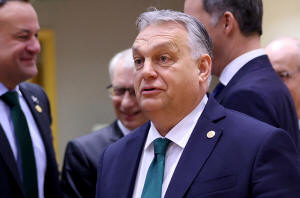Hungary under pressure to ratify Sweden's NATO bid after EU deal
 Send a link to a friend
Send a link to a friend
 [February 02, 2024]
By Krisztina Than [February 02, 2024]
By Krisztina Than
BUDAPEST (Reuters) - Pressure is mounting on Hungary to ratify Sweden's
bid to join NATO after Budapest finally joined other European Union
states in agreeing on new aid to Ukraine.
Prime Minister Viktor Orban said on Friday he "went to the wall" for his
country before agreeing to the EU deal worth 50 billion euros ($54
billion) at a summit in Brussels on Thursday after weeks of resistance.
Hungary had been the only one of the 27 EU member states not to back the
deal at a December summit. It is also the only NATO country that has not
yet ratified Stockholm's membership application, a process that requires
the backing of all members.
Orban, who has better ties with Russia than other EU states and most
NATO members, says his government backs Sweden joining the alliance. Now
he faces pressure from abroad to accelerate the process.
Opposition lawmakers have called an extraordinary session of parliament
for Monday to put Sweden's NATO accession on the agenda. But lawmakers
in Orban's governing Fidesz party told Reuters on Thursday they would
"wait" with a final vote until a meeting of Orban and Swedish Prime
Minister Ulf Kristersson.

Orban's press chief did not respond to a Reuters query on Friday on when
the meeting might take place.
Orban has a commanding majority in parliament which he has often used to
ram through legislation, in some cases overnight, with his ruling
party's lawmakers rubber-stamping policy changes.
Pressure rose on Orban to speed up the Swedish ratification process
after senior U.S. lawmakers said they wanted Hungary to immediately
approve Sweden's accession, suggesting Budapest risks permanent damage
to its relationship with Washington if it does not act.
"TO THE WALL"
Hungary has not overtly made any demands of NATO as it drags its feet on
approving Sweden's accession.
[to top of second column]
|

Hungary's Prime Minister Viktor Orban attends a European Union
summit in Brussels, Belgium February 1, 2024. REUTERS/Johanna Geron/File
Photo

Agreement on the EU aid for Ukraine finally came quickly on Thursday
after the long resistance by Hungary, which has refused to send
weapons to Ukraine since Russia's full-scale invasion and whose
relations with Ukraine have been marred by tension over the
treatment of 150,000 ethnic Hungarians living in western Ukraine.
Orban has been a vocal critic of the EU's financial and military
support for Kyiv and has maintained ties with the Kremlin throughout
the war.
"I went to the wall," Orban said in a radio broadcast.
"If this deal had not been reached and Hungary had continued to use
its right of veto then 26 member states would have agreed to send
the money to Ukraine ... and would have taken away the funds
earmarked for Hungary and sent that to Ukraine as well -- why would
that have been good?".
Under EU practices, it is not possible for money allotted to a
member state in the EU budget, or in what is known as the recovery
fund, to be taken away and given to a country outside the EU.
After freeing up access to some tranches of EU funds in December to
Hungary, the EU executive, the European Commission, is still
withholding some 20 billion euros from Budapest over widespread
accusations that Orban has damaged democracy at home during his 13
years in power. His government rejects these allegations.
(Reporting by Krisztina Than; Editing by Hugh Lawson and Timothy
Heritage)
[© 2024 Thomson Reuters. All rights reserved.]This material
may not be published, broadcast, rewritten or redistributed.
Thompson Reuters is solely responsible for this content.
 |